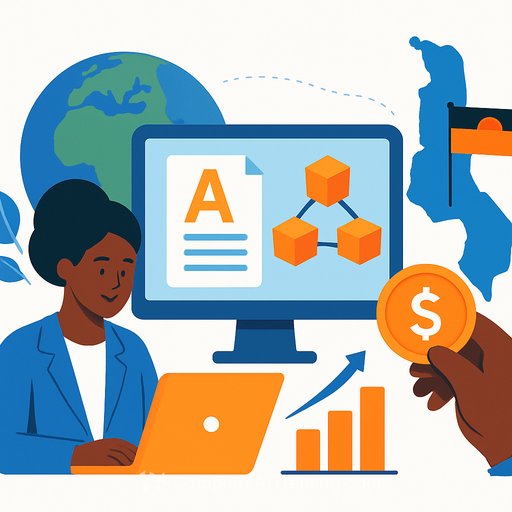Malawi Launches First AI-Verified Paris Agreement Platform, Setting a New Global Standard for Climate Finance Integrity
Belém, Brazil/India/Singapore - 15 November 2025. On Finance Day at COP30, the Government of Malawi introduced the world's first AI-driven, blockchain-verified Paris Agreement Implementation Platform (PAIP) and an Environmental Treasury built for scale.
Developed with the Green Economy Partnership (GEP) and TRST01, the platform links national emissions accounting, project origination, validation, auctioning, and retirement into one digital system. Every credit and transaction sits on a public ledger, giving financiers verifiable proof of impact and ownership.
What PAIP Does
The PAIP connects Malawi's entire emissions value chain, from inventory to retirement, within a single infrastructure. It pairs AI with satellite imagery, machine learning, smart contracts, and immutable blockchain records to measure, report, verify, and settle climate actions with scientific precision.
The goal: deliver auditable, investor-ready climate assets under Article 6-without the high overhead and friction that have slowed project pipelines across emerging markets.
Why This Matters for Finance
Integrity is the core risk variable in carbon markets. Malawi's approach gives investors a line of sight from national inventory to credit issuance and retirement, reducing due-diligence drag and information asymmetry. It also offers regulators and verifiers evidence trails strong enough for compliance checks.
- Traceable credits: Each tonne is tracked from project activity to retirement on a public ledger.
- Lower verification risk: AI-validated data and automated MRV cut manual error and fraud exposure.
- Clearer price discovery: Standardized project data and on-platform auctions improve comparability.
- Article 6 readiness: Infrastructure built for internationally transferred mitigation outcomes (ITMOs) and national reporting.
How the System Works
- AI-enabled national emissions data lake feeding automated GHG inventories and long-term strategy updates.
- Satellite imagery and machine-learning models to monitor emissions, restoration, and project performance.
- Smart contracts to manage issuance, auctioning, settlement, and retirement events.
- Blockchain-secured records for credits, transactions, and audit trails-visible to regulators, verifiers, and buyers.
- Built-in tools: climate project matching, resilience scoring, and a data confidence index.
"We can track every ton of CO₂ for its efficacy, every hectare restored, and the returns-GDP, IRR, and jobs-of every dollar invested with scientific precision," said Richard Perekamoyo, Principal Secretary, Ministry of Natural Resources and Climate Change, Republic of Malawi. "This strengthens trust in our national data and results."
"Integrity begins with data," said Ivano Iannelli, Chief Sustainability Officer at GEP. "By embedding AI within the national emissions data lake and securing it via blockchain, Malawi is creating a new standard of transparency and accountability that can raise investment across the Global South."
Hon. Jean Mathanga, Minister of Natural Resources and Climate Change, underscored that the PAIP signals a new era for African leadership in climate innovation and governance-positioning Malawi to attract green capital and turn commitments into investable national assets.
Investor Impact: What Changes on Your Desk
- Faster diligence: Standardized data, third-party-verifiable records, and automated MRV shorten deal cycles.
- Portfolio quality: Consistent resilience scoring and data confidence indexes support risk-adjusted allocation.
- Execution clarity: On-platform auctions and retirement reduce settlement frictions and reconciliation costs.
- Reporting: Audit-ready evidence supports compliance reporting and voluntary claims.
Access for the Global South
Within GEP's Digital Climate Transformation Program, the PAIP will be offered at no cost to other Global South governments, accelerating Article 6 implementation and directing climate finance to where it's needed most. TRST01 serves as the core technology partner, with the platform tailored to national priorities.
Context: Article 6 in Brief
Article 6 enables countries to cooperate on emissions reductions and transfer outcomes across borders. For a concise overview, see the UNFCCC's Article 6 resources.
What Finance Teams Should Do Next
- Map upcoming PAIP auctions and assess alignment with your compliance or voluntary demand.
- Integrate PAIP data fields (resilience score, data confidence index, issuance/retirement hashes) into risk and reporting workflows.
- Update counterparty and project screening checklists to reflect AI-verified MRV and on-chain provenance.
- Coordinate with legal on Article 6 claims, transfer documentation, and retirement proof for disclosures.
Scaling Signal
Following this global debut, GEP plans to expand the PAIP across Africa, Asia, and Latin America. Expect growing supply from AI-verified, blockchain-recorded credits, clearer issuance pipelines, and tighter links between national inventories and market issuance-key inputs for pricing, liquidity, and risk management.
Your membership also unlocks:






